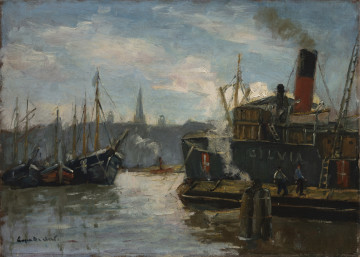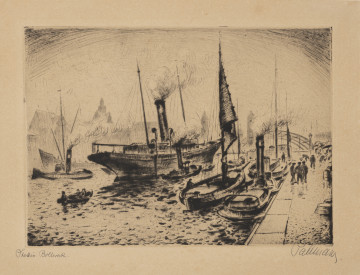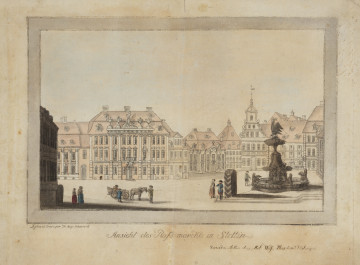
View of the harbour and the Castle Hill
około 1930
National Museum in Szczecin
Part of the collection: Iconography of Szczecin in the 17th-19th centuries
Architectural and landscape motifs of Szczecin and its surroundings in the second half of the 19th century showed social changes following the industrial revolution. The increase in the importance of wealthy bourgeoisie and its activity in professional, social, political and cultural life resulted in appearance in Szczecin's architecture of such buildings as stock exchange, Masonic lodge, municipal theatre, but also restaurants, curing and resting places located outside the centre of agglomeration, in forests by the lakes. They were very popular among Szczecin's residents, which was caused by the fashion for recreation and bathing close to nature. Arkona Forest (Eckerberger Wald), a recreational area abundant in small lakes and streams, in the north-western part of the city, was particularly popular. Within the forest park, on the site of former Martinsee Lake, there is now the famous Arkonka bathing site. The area with the buildings of the hydrotherapy institute was illustrated between 1890 and 1910 by A. Windel. The cold-water spa was founded in 1860 as the Viecksche Kaltwasserheilanstalt Eckerberg. In the 1870s, it was bought and reactivated in 1886 by Johannes Quistorp (1822-1899), a businessman, landowner and philanthropist from Szczecin. In 1890, new sanatorium buildings were erected on the site of the Ernst Moritz Arndt Foundation (1769-1860), in honour of the German writer and historian. The Stiftung Ernst-Moritz-Arndt-Haus accommodated the nervously and mentally ill, those with metabolic disorders, spinal injuries and convalescents after heavy operations, mainly from Berlin. In 1927, the building was completely renovated. During the Second World War, it was destroyed, except for the building called Larchwood Manor, which was entered in the register of historical monuments in 1983. A precise lithograph by a little-known author depicts the water cure facility before its reconstruction. A photograph was probably used to reconstruct it.
Małgorzata Peszko
Author / creator
Dimensions
cały obiekt: height: 11,2 cm, width: 19 cm
Object type
lithogrphy (print)
Creation time / dating
Creation / finding place
Identification number
Location / status

około 1930
National Museum in Szczecin

1920 — 1935
National Museum in Szczecin

około 1790
National Museum in Szczecin
DISCOVER this TOPIC
Museum of King Jan III's Palace at Wilanów
DISCOVER this PATH
Educational path